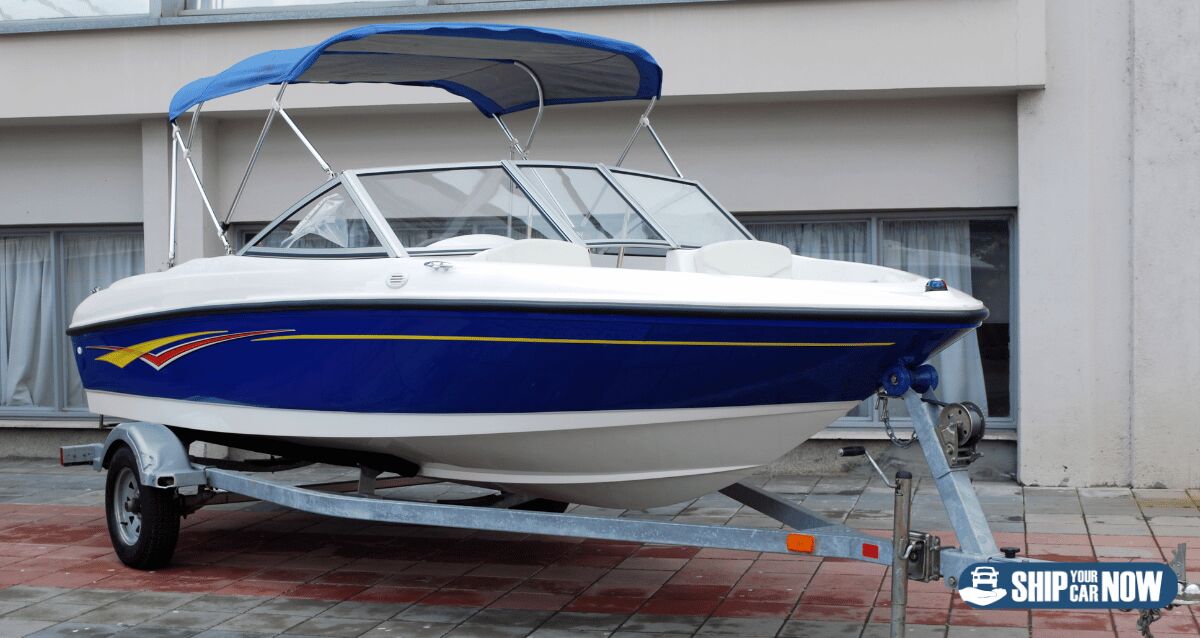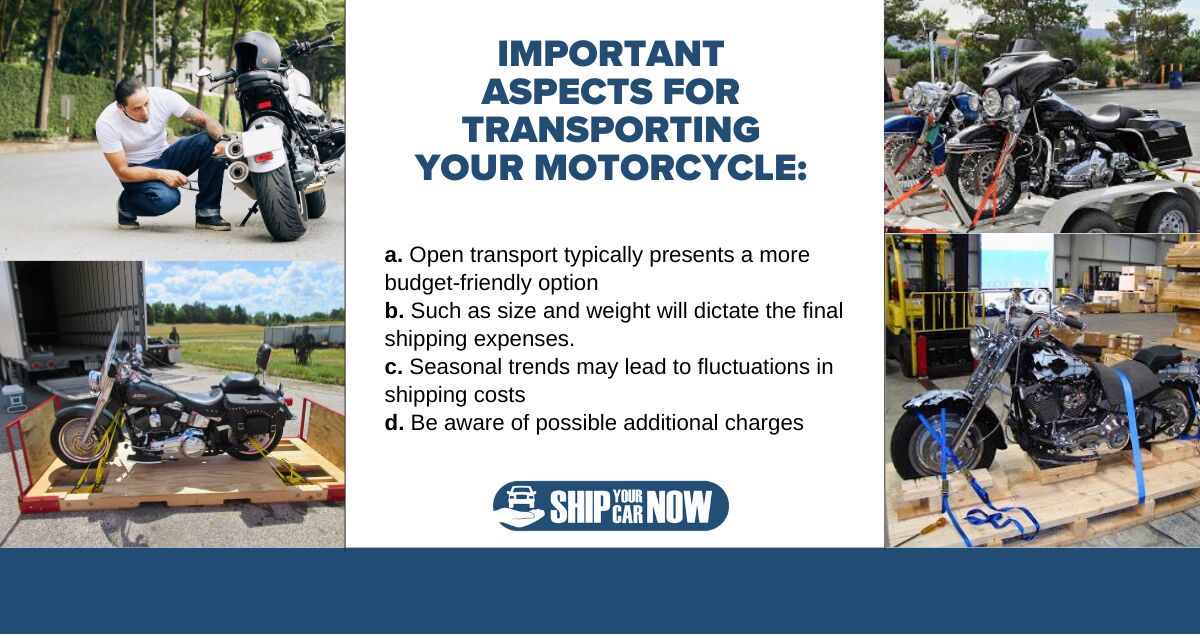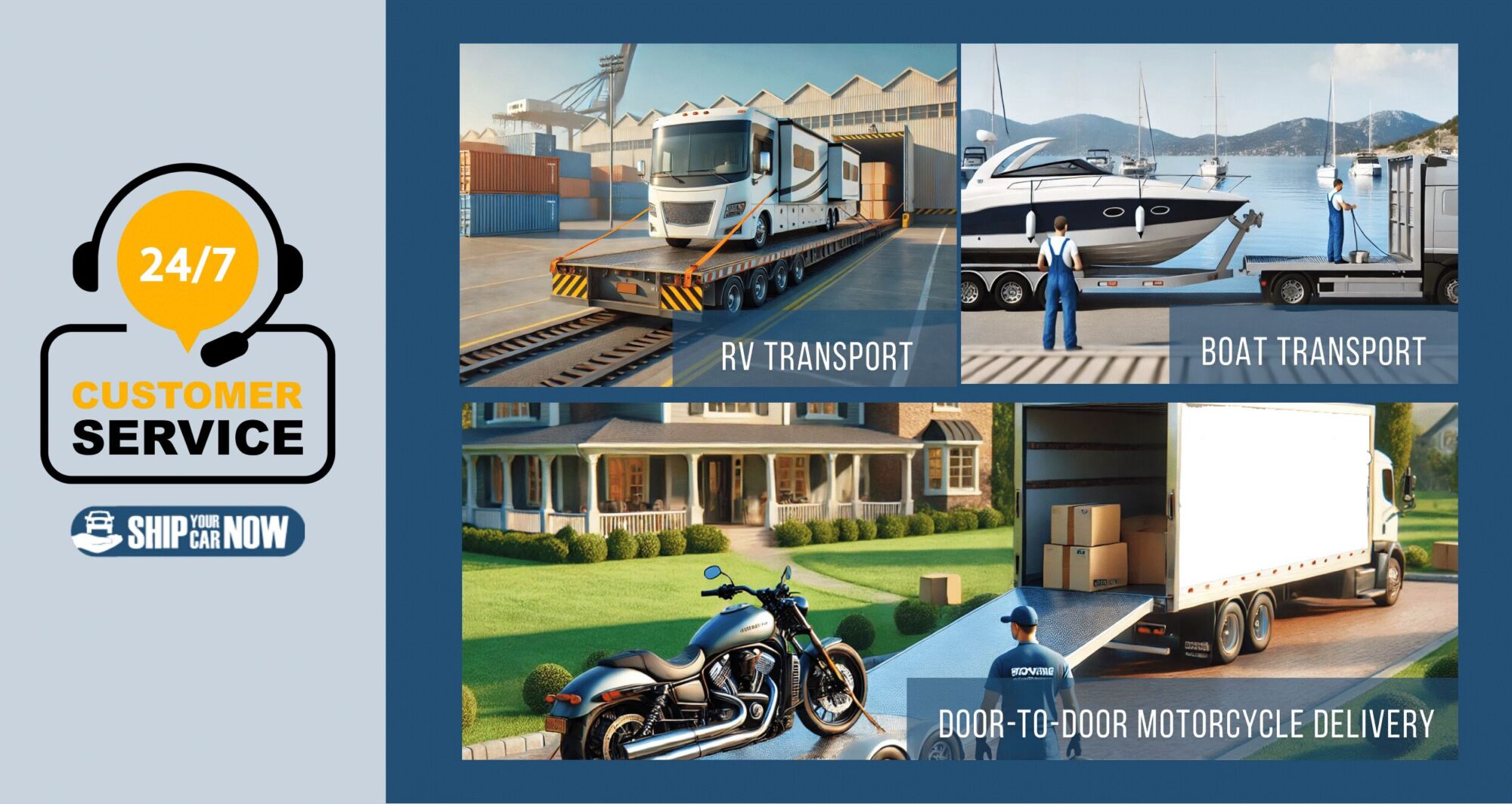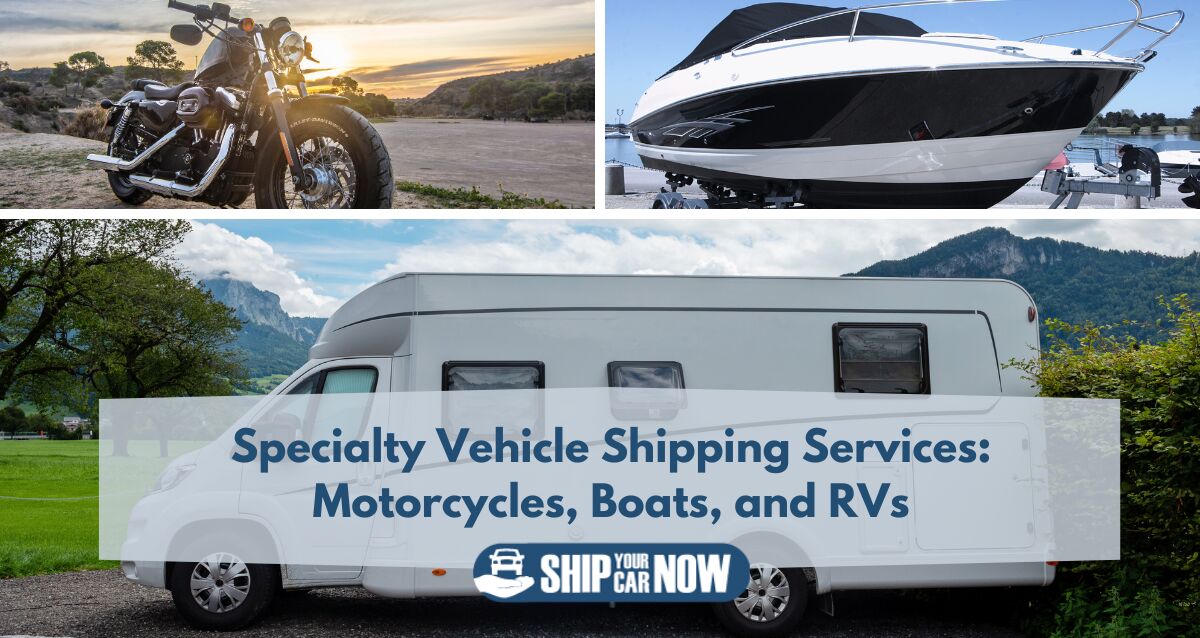 When you need to ship a specialty vehicle—be it a motorcycle, boat, or recreational vehicle (RV)—you’re faced with a unique set of challenges. How do you ensure safe transportation? What are the car shipping costs involved? And which shipping service can you trust for your valuable asset?
When you need to ship a specialty vehicle—be it a motorcycle, boat, or recreational vehicle (RV)—you’re faced with a unique set of challenges. How do you ensure safe transportation? What are the car shipping costs involved? And which shipping service can you trust for your valuable asset?
Specialty vehicle shipping services offer tailored solutions to these questions, allowing for secure, reliable, and efficient transport of your prized possessions. Get ready to discuss the decision-making process, ensuring that your specialty vehicle arrives at its destination in top condition.
Be sure to contact ShipYourCarNow today for a free instant quote!
Key Takeaways
- Specialty vehicles such as motorcycles, boats, and RVs require custom shipping solutions that account for the unique care and logistics involved, with options like door-to-door car shipping for motorcycles, and specific preparations and handling for boat and RV transport.
- When choosing a specialty car transport service company, verifying their track record, licensing, and insurance coverage are all important steps.
- Car shipping costs considerations in specialty vehicles vary widely and are influenced by the vehicle type, distance, size, weight, transport method, and seasonal demand.
Navigating Specialty Vehicle Shipping: Motorcycles, Boats, and RVs

Specialized transportation services, such as the ones provided by ShipYourCarNow, are necessary for the relocation of unique vehicles like motorcycles, boats, and RVs. Let’s dive in!
Motorcycle Shipping Essentials
Transporting a motorcycle encompasses much more than simply moving an item. It’s often seen as a gesture of care and appreciation. Motorcycles aren’t merely vehicles for many enthusiasts—they are treasured partners on the road, symbols of autonomy, and objects of significant personal pride. As such, door-to-door shipping is frequently the most sought-after option among clients. It guarantees that your motorcycle will arrive where you need it when you need.
Should you prefer to retrieve your motorcycle from a designated spot yourself, you can opt for terminal-to-terminal transport, allowing for flexibility based on individual schedules.
For maximum protection during shipment, seeking out enclosed carriers through professional companies specializing in motorcycle logistics is advisable—these entities typically run operations founded by fellow riders who are well-versed with nuances involved in handling bikes safely and efficiently.
Boat Transport Basics
 Transporting a boat requires attention to detail, whether dealing with a yacht or an intimate sailboat. It is essential to ensure all loose items are secure and cabin doors locked while also checking that the vessel doesn’t contain extra fuel or water before transit.
Transporting a boat requires attention to detail, whether dealing with a yacht or an intimate sailboat. It is essential to ensure all loose items are secure and cabin doors locked while also checking that the vessel doesn’t contain extra fuel or water before transit.
Transport methods can differ based on boat type. Smaller vessels often utilize trailers for shipping, while larger ones may need tailored solutions designed specifically for them.
When considering the cost of transporting a boat, several factors come into play, these range from transportation distance, the size, and weight of your boat to seasonal demand fluctuations.
RV Relocation Know-How
Transporting an RV may seem overwhelming at first, but leave it to us to walk you through the process stress-free.
You have several transport options tailored to meet different needs. Open transport is the most cost-effective and commonly used method, where vehicles are transported on open trailers. Enclosed transport provides added protection from the elements and road debris, ideal for luxury or classic cars. Delivery options vary, door-to-door service brings the vehicle directly to your location, while terminal-to-terminal shipping is a more economical option where vehicles are dropped off and picked up at specific locations. Each option allows for flexibility and can be customized to best suit your timeline, budget, and vehicle type.
Selecting Your Specialty Transport Company

 Selecting a reliable transport company to ship your specialty vehicle is crucial. Use the following list to identify viable transport companies for your specialty vehicle.
Selecting a reliable transport company to ship your specialty vehicle is crucial. Use the following list to identify viable transport companies for your specialty vehicle.
- Check Reputation: Look for customer reviews and ratings to assess reliability.
- Verify Compliance: Ensure the company meets industry regulations and has necessary certifications, which includes checking for a valid license to operate, as evidenced by an MC number from the Federal Motor Carrier Safety Administration (FMCSA).
- Consider Experience: Choose a company experienced in your specific transport type. This is key for specialty vehicles.
- Review Insurance: Check their insurance coverage for lost or damaged goods.
- Compare Pricing: Get quotes from multiple companies and look for value, not just low prices.
- Check Equipment: Ensure they have the right vehicles and tools for your goods.
- Confirm Delivery Times: Make sure they can meet your deadlines.
- Ask About Flexibility: See how they handle changes in schedules or issues that arise.
Now you can confidently select a transport company that meets your needs, ensuring your specialty vehicle is handled with care and arrives safely at its destination!
Cost Considerations in Specialty Vehicle Shipping
 The expense associated with shipping is a significant consideration, especially when it comes to transporting specialty vehicles. The cost involved in this process can be influenced by various elements, including the travel distance and the dimensions, as well as the kind of vehicle being shipped.
The expense associated with shipping is a significant consideration, especially when it comes to transporting specialty vehicles. The cost involved in this process can be influenced by various elements, including the travel distance and the dimensions, as well as the kind of vehicle being shipped.
We should examine in detail the intricacies related to costs for different categories of specialty vehicles.
Motorcycle Transport Pricing Factors:

The cost of shipping a motorcycle is subject to variation due to multiple elements. One pivotal factor that influences the rate is the transportation distance, with prices oscillating between $0.30 and $0.70 for each mile traveled. Transporting a motorcycle over 1,500 miles can set you back by at least $900, and this figure tends to surge by approximately $100 with every extra stretch of 500 miles.
When contemplating transport options for your motorcycle, it’s important to weigh several aspects:
- Open transport typically presents a more budget-friendly option than enclosed transport but offers less protection.
- The physical attributes, such as size and weight, will also dictate the final shipping expenses. Bikes that are bulkier or heavier might attract surcharges.
- Seasonal trends may lead to fluctuations in shipping costs—expect potential hikes during peak periods like springtime and summertime when demand rises.
- Be aware of possible additional charges, including fuel surcharges, which could increase the overall expenditure on shipment.
Taking these variables into account will assist in planning financially for transporting your motorcycles securely and efficiently.
Boat Shipping Costs:
 The transportation cost for a boat will vary depending on the length of travel, vessel dimensions and weight, along with the complexity involved in navigating the chosen route.
The transportation cost for a boat will vary depending on the length of travel, vessel dimensions and weight, along with the complexity involved in navigating the chosen route.
Transporting larger and heavier vessels often requires more specialized handling and equipment, which typically increases shipping costs. Prices for shipping boats may also fluctuate seasonally, with higher rates commonly seen during summer months when demand tends to surge.
Selecting between transport methods can affect costs too. Open transport might be less expensive but offers lesser protection compared to other options. Consolidating multiple vessels into one shipment could provide an opportunity for reducing expenses.
Understanding RV Transport Expenses:
The cost of transporting an RV is significantly influenced by the vehicle’s weight and the distance it needs to travel. Costs escalate with both the increased weight of the RV and the extended distances involved in transport.
In terms of specific types of recreational vehicles, larger Class A motorhomes incur higher per-mile shipping fees than their counterparts like Class C motorhomes or fifth-wheel trailers and travel trailers do.
Preparing Your Specialty Vehicle for Transport

 Prior to the transport of your vehicle, it is essential to prepare. Thoroughly preparing your vehicle is necessary for an easy transportation experience. All specialty vehicles have similarities in terms of preparation, such as needing to have the proper paperwork prepared, but they do vary slightly, let’s review:
Prior to the transport of your vehicle, it is essential to prepare. Thoroughly preparing your vehicle is necessary for an easy transportation experience. All specialty vehicles have similarities in terms of preparation, such as needing to have the proper paperwork prepared, but they do vary slightly, let’s review:
Motorcycle Prep Checklist:
- Clean & Inspect the Motorcycle: Wash your bike to remove dirt and debris. This helps you then inspect for any existing damage. This includes removing any accessories, such as saddlebags, mirrors, etc.
- Check Fluid Levels: Ensure oil, coolant, and fuel levels are appropriate. If possible, keep the fuel tank no more than a quarter full to reduce weight and risk.
- Battery & Tire Check: Consider disconnecting it to prevent drainage during transport. Also ensure the tires are in good condition for loading and transport.
- Secure Loose Parts: Tighten any loose bolts or components, including the handlebars and foot pegs.
Boat Prep Checklist:
- Protect & Secure the Boat: Protect the boat’s exterior by applying shrink wrap, particularly to sensitive surfaces like teak. Ensure all loose items inside the boat are secured. This includes taping hatches and locking all exterior doors.
- Check Fluid Levels: Empty fuel and water tanks (if applicable).
- Secure Loose Parts: Remove equipment like anchors and sails, and be sure to disconnect all electronics and unplug the batteries.
RV Prep Checklist:

- Clean & Secure Interior: Wash your RV to remove dirt and debris to better conduct an inspection of existing damage. Be sure to then detach and secure all loose/hanging items.
- Check Closures: Fasten cabinets, doors, and windows with latches or adhesive tape
- Check Utilities: Disconnect sever connections to gas, electric power, and water services, and also be sure to keep fluid levels low and gas at a quarter tank or less to reduce excess weight.
- Secure External Attachments: Restrain doors, awnings, and any other protrusions, and make sure slid-out sections are locked in place.
Insurance: Ensuring Peace of Mind

When you hand over your precious vehicle to a transport service, the desire to monitor its movement is understandable. Tracking and insurance are critical aspects of specialty vehicle shipping, offering key advantages such as:
- Assurance that your vehicle is protected during its transit
- The convenience of monitoring your vehicle’s location at any moment
- Coverage for unforeseen damage or loss while in transportation
Now, let’s explore the mechanisms of tracking and insurance across various categories of specialty vehicles.
Safeguarding Your Specialty Vehicle During Transit:
I nsurance is essential in the shipping process of a specialty vehicle, as it protects against potential damage or loss.
nsurance is essential in the shipping process of a specialty vehicle, as it protects against potential damage or loss.
Understanding the specifics of your insurance policy, including any coverage limits and exclusions, is vital. You may wish to explore extra options like ‘All-Risk’ insurance policies.
Verifying that the shipping company’s provided insurance adequately covers the full value of your specialty vehicle is very important. If their coverage falls short, securing additional insurance might prove to be wise.
Custom Solutions for Uncommon Vehicles
From high-powered motorcycles to antique recreational vehicles, or tailor-made boats, each presents distinct challenges that necessitate transport solutions.
Transporting High-Performance and Vintage Motorcycles:
Transporting high-performance and vintage motorcycles goes beyond mere shipping. These bikes are often treasured as masterpieces. Due to the presence of delicate electronics and the use of lightweight components, these kinds of motorcycles need extra protection while in transit. Enclosed transport service is ideal for such bikes as it offers protection against atmospheric elements and road debris that could potentially harm them.
No matter if it’s a race-ready performance bike or a prized antique motorcycle you’re looking to move, reliable transport services are available that will cater specifically to the distinct requirements posed by your particular bike.
Yacht and Sailboat Specifics:
 Yachts and sailboats are more than mere aquatic vehicles. They represent opulent maritime residences [3]. The shipping of these luxury crafts demands meticulous planning and expert handling. This includes creating a precise stow plan to guarantee the secure and efficient positioning aboard a ship, firmly strapping down the yacht for stability during its journey, employing specialized lifting gear like cranes to carefully place it onto the carrier, and working in tandem with the port authorities, as well as transport companies for seamless conveyance.
Yachts and sailboats are more than mere aquatic vehicles. They represent opulent maritime residences [3]. The shipping of these luxury crafts demands meticulous planning and expert handling. This includes creating a precise stow plan to guarantee the secure and efficient positioning aboard a ship, firmly strapping down the yacht for stability during its journey, employing specialized lifting gear like cranes to carefully place it onto the carrier, and working in tandem with the port authorities, as well as transport companies for seamless conveyance.
When transporting sailing yachts, specifically, additional preparatory actions might be necessary, which include dismantling or shielding sails to conform with vertical clearance limits or winterizing engines when faced with cooler climates.
Special Considerations for Unique RVs:
Transporting distinctive recreational vehicles, such as:
- upscale motor coaches
- caravan trailers
- vintage camper vans
- collapsible campers
Customized shipping solutions are crafted to address these requirements and guarantee that each RV is delivered safely and intact.
RV-specific transport services deliver extensive options tailored for various types of recreational vehicles, offering personalized and safeguarded shipping for every individual vehicle regardless of its uniqueness.
Reliable Specialty Vehicle Shipping Services: ShipYourCarNow’s All-Inclusive Solution
 ShipYourCarNow is a trustworthy transport service provider that specializes in the delivery of diverse vehicles. We are committed to delivering efficient and reliable services, ensuring complete customer satisfaction. Our company handles everything from door-to-door motorcycle delivery and transcontinental RV transport to overseas boat shipping with ease.
ShipYourCarNow is a trustworthy transport service provider that specializes in the delivery of diverse vehicles. We are committed to delivering efficient and reliable services, ensuring complete customer satisfaction. Our company handles everything from door-to-door motorcycle delivery and transcontinental RV transport to overseas boat shipping with ease.
We pride ourselves on our superior 24/7 customer support as well as claim assistance for our clientele, truly transforming the vehicle transportation experience by offering an all-inclusive solution designed to simplify the process of relocating your vehicle. Request a specialty vehicle shipping quote today!
We Can Help!
The process of car shipping does not end with your vehicle’s arrival. At ShipYourCarNow we provide car shipping service in excellence with easy door-to-door car shipping – contact us today for an instant quote!
Be sure to visit some of our popular state car shipping pages to learn more about auto transport prices.
- California Car Shipping Service
- Colorado Car Shipping Services
- Florida Car Shipping Service
- New Jersey Car Shipping Service
- New York Car Shipping Service
Frequently Asked Questions
How do you know if a car shipping company is legit?
In confirming the legitimacy of a car shipping company, one should compile relevant details, scrutinize consumer testimonials, carefully review the moving estimate and conditions involved, as well as inquire when payments are expected to be made. Verifying that they have legitimate MC and USDOT numbers is essential. It’s also advisable to consider favorable reviews on reputable sites such as the BBB (Better Business Bureau) and Trustpilot.
How much does a car carrier ship cost?
Depending on various elements like the distance to be covered, the type of vehicle being shipped, and the chosen method of transport, shipping a car typically ranges in cost from $900 to $1,800. The average expense per mile falls between $0.60 and $1.90 for transporting vehicles. For shipping across the entire country, costs range from $1,200 to $2,400 on average.
Will the Marine Corps ship my vehicle?
Certainly, if you are assigned a permanent change of station orders and the destination permits it, the Marine Corps will arrange for your privately owned vehicle to be shipped. In the event that shipment is not permitted by the receiving country, storage for your vehicle will be made available instead.
What factors influence the cost of motorcycle shipping?
The expense associated with transporting a motorcycle is affected by various elements, such as the distance that needs to be traversed, the method of shipping selected, the dimensions and heft of the bike, seasonal considerations, as well as supplementary charges like those for fuel.








Senior automotive logistics professional with a passion for the industry and a 10+ year history of accomplishments. Proven track record of exemplary client management working with both RMCs, Van Lines and OEMs. Keen ability to react to an ever-changing marketplace while offering superior technology solutions, programs and services. Architect of award winning auto transport portal technology offering transparency and agility to clients, agents and transferees. Successful team builder and leader easily managing budgets with effective leadership, strategic planning, and problem-solving capabilities.